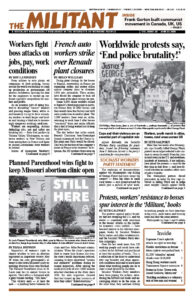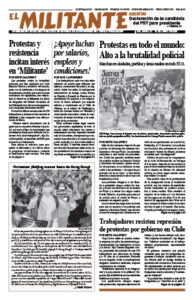From airlines to auto plants, oil companies to food packing, bosses around the world are pushing to crank up production as governments lift onerous lockdowns, opening the door for the employers to ratchet up cutthroat capitalist competition for markets and profits.
As an essential part of doing this, they’re discarding “excess” workers and pressing wages down, while simultaneously trying to force remaining workers to work longer and harder, and turning a blind eye to increasingly dangerous working conditions.
Workers are responding. Actions defending jobs, pay and safety are breaking out — from fruit packers in Yakima Valley, Washington, to sanitation workers in New Orleans and from autoworkers in France and Spain to sacked Debenhams store workers in Ireland.
Scores of immigrant blueberry pickers at Durango Farms in Cutler, California, walked out May 25 after their piece rate pay was reduced from $7 to $6.50 per bucket. With the help of their union, the United Farm Workers, they won improvements in pay and conditions. They gained cleaner and more accessible bathrooms in the fields and the promise of no retaliation.
Workers at Columbia Reach Pack in Yakima are keeping their picket lines up as their strike nears four weeks. Supporters of the packing plant workers, including Larry Brown, president of the Washington State Labor Council, participated in an 85-car caravan May 30 to bolster the picket lines.
Every one of these fights deserves solidarity. Only through building a fighting working-class movement that unites all of us who are forced to sell our labor power to survive can we push back against the attacks of the bosses and their government.
Under these conditions, millions of workers and youth have flooded into the streets to join unprecedented worldwide mobilizations against police killings and brutality. These actions give workers a sense of our capacity to come together and fight in our own interests, dealing blows to months of social isolation.
The cops and the capitalist rulers’ whole oppressive and violent criminal “justice” system exists for only one purpose — to “serve and protect” the tiny handful of billionaire families and their hangers-on who profit off our exploitation. It’s part and parcel of controlling our class amid the social crisis we’re living through.
Millions of workers have been furloughed, some for months, some permanently. The bosses have more in store as they try to get lean and mean. BP announced June 9 that they will dump 10,000 oil workers. You’ve got to look “beyond the clear human tragedy,” CEO Bernard Looney said, and focus on the “consequences for our industry and our company.”
BMW bosses announced plans to get rid of 5,000 “positions.” Renault, Nissan and other auto companies have similar plans.
At the same time, food prices are rising rapidly — the fastest inflation in over four decades. The bosses’ answer? They’re going to help out by putting less food in smaller packages to cut the price!
When the bosses and their governments tell us over and over that “we’re all in this together” — it’s a patent lie. Their greed to rake in profits on our backs is in direct conflict with our need for jobs, pay at union-scale wages and control over every aspect of production. Their morals arise from their system of exploitation, ours from growing solidarity in struggle.
Shutdowns for the past two months have left depression-era levels of unemployment in the U.S., with 30 million workers getting unemployment benefits. This official figure hides those unable to get any benefits, including immigrant workers, many temps, “self-employed” workers like Uber drivers and many others. Another 6 million have stopped looking for work altogether. But for the first time in two months, with the economy beginning to open up, there is an uptick in jobs, with gains outweighing losses.
This is what workers need — economic expansion and more hiring, that can give them more confidence to fight for higher wages and better conditions.
The government says 2.5 million jobs were “created” in May, largely through the recall of furloughed workers as employers reopened. More than half were jobs in restaurants and bars. Nearly half a million were in construction.
One of the areas where layoffs are deepening is among government workers. Of the 1.9 million fresh applicants for unemployment benefits in May, over a quarter were government employees, as state and municipal authorities slash jobs to “balance” soaring budget deficits caused by the lockdowns.
Millions of workers face mounting bills, credit card and all kinds of other debts, car payments, and rent or mortgages. The daily papers are full of pictures of miles-long lines of cars full of workers waiting to get some help from food banks all across the country.
Workers fight job cuts, boss attacks
Some 2,000 workers at Debenhams department stores were unceremoniously laid off when the British-based chain shuttered their Irish stores April 19. They’ve been picketing and protesting since and gaining solidarity for their fight to win their jobs back. Through daily pickets they seek to prevent bosses from removing stock to sell in the U.K. At the main Dublin store, they’ve gotten support from nearby supermarket workers and customers, Jane Crowe, one of the workers, told the Militant June 5.
By putting the Irish wing of the company into liquidation, Debenhams bosses ensured workers also lost severance pay, so some have no income. Since then workers, backed by their union, Mandate, have held weekly protests outside stores and at the Irish parliament.
Meanwhile, Debenhams stores in the U.K. were shut down by the government’s lockdown orders. The bosses laid off hundreds of workers before the stores are being allowed to reopen June 15. Like their workmates in Ireland, this means they won’t receive severance pay. “Debenhams think they can walk all over them, like they’re trying to do to us,” Crowe said. “We all need to stand together.”
According to government figures, there are over 40 million jobless workers across Europe. Led by a deep slump in the auto industry, industrial production in Germany — the dominant economic power in the EU — fell by 25% compared to a year ago.
Hundreds of millions across the semicolonial world in Latin America, Asia and Africa have been thrown out of work by a combination of government shutdowns and the collapse of world production and trade. In contrast to unemployment protections — however inadequate — that workers have won in most imperialist countries, most now face life with little or no social “safety net.” Strikes and protests by workers demanding jobs and relief have broken out in India, Chile, Colombia, Nigeria, Ecuador and elsewhere.
Crisis facing workers on the seas
Fifteen Romanian crew members on Royal Caribbean’s cruise ship Navigator of the Seas staged a hunger strike in early May after the company postponed their flights home several times over two months. Some 100,000 crew members on cruise ships were left in limbo at sea after the coronavirus shut down the industry. The Atlanta-based Centers for Disease Control and Prevention stipulated that foreign crews can only be repatriated by charter flights. Cruise bosses balked at paying for expensive private airlifts.
Government restrictions on air travel, and 14-day or longer quarantine requirements for those who are able to get around, have created a crisis for tens of thousands of workers in the global shipping industry. Shipping bosses have used these restrictions to largely halt any crew changes aboard their vessels. Workers’ contracts and union agreements call for limits on the duration of service, but these are being ignored. This affects some 80% of the world trade still taking place today.
Unlike in the cruise ship industry, these workers don’t get exposed to coronavirus. They’re either at sea or, when they dock to load or unload cargo, they’re prevented from going ashore.
More than 150,000 seafarers, large numbers of whom are from the Philippines and India, have been stranded on merchant ships for months beyond their contractual limits. A similar number of workers slated to replace them are instead stuck at home without pay.
Without the opening of borders and air travel to seafarers, said Steve Cotton, general secretary of the International Transport Workers Federation, “the alternative is exhausted crews and the shutting down of global trade.”
The crew of at least one ship has already gone on strike, refusing to sail until they are relieved.
Pete Clifford from Manchester, England, contributed to this article.

